Sep 2017
CBS' appetite for crook-catching gets an app in Wisdom of the Crowd.
09/29/17 04:07 PM
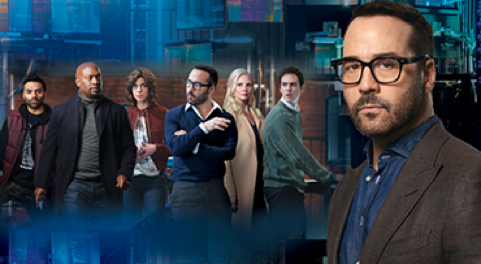
Jeremy Piven thinks he’s got an app for widespread crime-solving. CBS photo
Premiering: Sunday, Oct. 1st at 7:30 p.m. (central) on CBS
Starring: Jeremy Piven, Richard T. Jones, Natalia Tena, Monica Potter, Blake Lee, Jake Matthews
Produced by: Ted Humphrey, Adam Davidson, Avi Nir, Alon Shtruzman, Peter Traugott, Rachel Kaplan, Dror Mishani, Shira Hadad
By ED BARK
@unclebarkycom on Twitter
This particular premise didn’t go well earlier this year on Fox.
In APB, billionaire businessman Gideon Reeves (Justin Kirk) decided to devote himself to devising a same-named app that enabled the citizenry to immediately alert police to a crime. The cops also were given futuristic gear, cars and weaponry. Reeves’ overall impetus was to avenge the death of his best friend, whose murderer remained at large. Fox ended up quickly axing the show itself.
CBS’ Wisdom of the Crowd stars Jeremy Piven of Entourage fame as billionaire businessman Jeffrey Tanner. A year after his daughter, Mia’s murder, he remains unconvinced that the real killer is behind bars. So Tanner sells off the tech company he founded, named All Sourcer, and throws himself into funding an app called Sophe. The intent is to revolutionize law enforcement by using publicly shared information as a “real time, crowd-sourced crime-solving” device. It also helps that Tanner has offered a cool $100 million to anyone providing info that identifies and/or apprehends his daughter’s killer.
Piven’s Tanner doesn’t have the swagger of APB’s leading rich man. His best moments are early on in Episode 1, when he announces the sale of his company to staffers while choking back tears at the remembrance of his late daughter.
Sophe’s headquarters is in Oakland, where a converted old building houses “The Hive.” The resident skeptic is newly hired Detective Tommy Cavanaugh (Richard T. Jones), who earlier investigated Mia’s murder. When Cavanaugh wonders about the constitutionality of Sophe, Tanner sniffs, “Privacy. We gave that up a long time ago so we could watch cat videos on our phone.”
That’s about as deep as Wisdom of the Crowd gets in terms of asking any Big Questions. Tanner’s staff also includes engineer/confidante/secret bedmate Sara Morton (Natalia Tena); head programmer Josh Novak (Blake Lee), described in CBS publicity materials as “nerdy cool;” and new recruit Tariq Bakari (Jake Matthews), who impresses Tanner by hacking Sophe.
Against the whole damned thing is Tanner’s ex-wife, congresswoman Alex Hale (Monica Potter), who tells him “it’s over” and that nothing will bring Mia back. She gets nowhere, epitomizing Congress.
Unlike APB’s quick solve, it looks as though the identity of Mia’s real killer will be a connective thread through multiple episodes of Wisdom of the Crowd. In the opener, a different murder instead ends up being solved. By the end of the hour, just about everyone seems to have the Sophe app on their phones, which also was the case in APB. “People want to be part of something meaningful,” Tanner says of both the app’s instant popularity and “The Crowd’s” willingness to gang-stalk a suspect.
Piven’s OK in his latest starring role while Jones brings some ‘tude as Cavanaugh, who’s African-American, not Irish. “Procedural” crime dramas have a much better chance to live long and prosper on CBS than Fox. So Wisdom of the Crowd has that going for it in contrast to APB..
OK, back to my Fantasy Football app to check out the latest injury reports. Some of us just don’t have time for this mass participation crime-busting thing.
GRADE: C+
Email comments or questions to: unclebarky@verizon.net
Who you gonna call? (not Ghosted)
09/28/17 02:00 PM
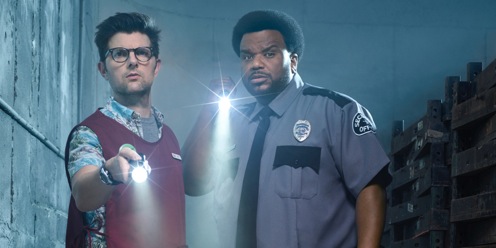
Premiering: Sunday, Oct. 1st at 7:30 p.m. (central) on Fox
Starring: Adam Scott, Craig Robinson, Ally Walker, Amber Stevens West, Adeel Akhtar
Produced by: Tom Gormican, Kevin Etten, Craig Robinson, Adam Scott, Jonathan Krisel, Naomi Scott, Oly Obst, Max Schulman
By ED BARK
@unclebarkycom on Twitter
There have been two re-castings in Fox’s Ghosted -- of a supporting player and of Ally Walker’s entire wardrobe.
The original pilot episode of this scarily mediocre pilot found Walker in an all-white dress as Capt. Ava Lafrey, head of the Bureau Underground. Now she’s all in black, but still in a dress. Sometimes this is what network “suits” bring to the process, although the entire first episode also could use a makeover.
Amber Stevens West (The Carmichael Show) also has supplanted Edi Patterson as a Bureau Underground tech specialist named Annie. But the bulk of the show is built around two male leads with good bloodlines.
Craig Robinson, formerly of The Office, plays ex-Los Angeles Police Department detective Leroy Wright, who’s lately a mall cop. Adam Scott (Parks and Recreation) is the likewise unfulfilled Max Jennifer, an astrophysicist and book author who was deemed nuts after claiming his wife had been abducted by aliens. He’s now toiling in a bookstore.
Both are quickly plucked into service after somehow being deemed the best two people on planet Earth to locate one of the Bureau Underground’s “finest agents” after he goes missing in the first episode’s opening minute. It turns out that Leroy excelled at finding missing persons while with the LAPD until an unfortunate tragedy knocked him for a loop. And while also teaching in college, Max found time to write The Multiverse Equation, which was prescient in its theory that there’s “another universe just like ours.”
They’re a clashing odd couple of course, but the ensuing “comedy” never really clicks. Leroy keeps trying to rid himself of Max, who pleads to stay in this game because otherwise he’ll remain a nobody. The overall incentive: Capt. Lafrey has promised to help both of them get their old jobs back if they succeed in what’s supposed to be a one-time mission.
Ghosted includes a few halfway decent special effects, but not much else, en route to the inevitable. Reluctant at first, Max and Leroy now want to stay on with the Bureau Underground in pursuit of whatever weird truths are out there. A kicker at the end gives Max a bigger stake in this than Leroy.
Ghosted likely will survive at least through Halloween, but seems very unlikely to be a long-distance runner for Fox. All three of the network’s new fall series, including The Orville and The Gifted (yet another Marvel enterprise premiering on Monday, Oct. 2nd) rely heavily on other worldly premises. Ghosted is the thinnest of them. And in a time slot directly opposite the first half-hour of NBC’s Sunday Night Football, it has every reason to run scared.
GRADE: C-minus
Email comments or questions to: unclebarky@verizon.net
ABC's Marvel's Inhumans is C-grade drama with a better than average villain
09/28/17 09:49 AM
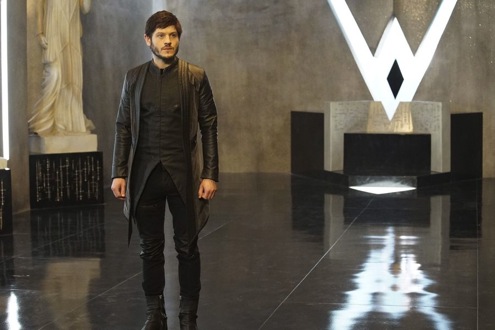
Premiering: Friday, Sept. 29th at 7 p.m. (central) on ABC before moving to regular 8 p.m. slot
Starring: Anson Mount, Serinda Swan, Iwan Rheon, Ken Leung, Eme Ikwuakor, Isabelle Cornish, Sona Balmores, Ellen Woglom, Mike Moh
Produced by: Roel Reine, Alan Fine, Stan Lee, Joe Quesada, Jim Chory, Jeph Loeb, Scott Buck
By ED BARK
@unclebarkycom on Twitter
Well, at least Iwan Rheon is back where he belongs.
As Game of Thrones’ thoroughly despised Ramsay Bolton, he finally received payback when his own ravenously hungry hounds made a meal of him. Marvel’s Inhumans -- yes, Marvel again -- finds Rheon comfily back in dark leather as the conniving, power-hungry Maximus. In the second half of ABC’s two-hour premiere, he even gets to threaten the life of a gargantuan, non-drooling, pretty lovable bulldog named Lockjaw. Oh the irony. Dogs bite man. Man smites dog?
He probably won’t go that far in terms of overall cruelty. But Maximus otherwise murders and back stabs his way through yet another fantastical tale of super-powered mutants endangered by predatory humans. This time out, most of them have secretly gathered on the moon and renamed it Attilan. But some down-to-earth humans may have detected their whereabouts. This prompts the easily riled Maximus to tell his mute brother King, a k a Black Bolt (Anson Mount from AMC’s Hell on Wheels), “We need to go to Earth now. We must strike first.”
Black Bolt doesn’t talk, not lately at least, because he has a lethal, “quasi-sonic” voice that earlier caused some very unfortunate consequences. His wife, Queen Medusa (Serinda Swan), likewise is no piker on the super power front. Her extra-long red tresses have both punching and strangling power. Therefore, best to go easy on the hair spray.
These first two hours of Inhumans got a two-week theatrical release in IMAX theaters before downsizing to ABC. The reception was less than enthusiastic, and one wonders how Inhumans now can possibly stand up to CBS’ competing and entrenched Hawaii Five-0 reboot when the ABC interloper moves to its regular Friday slot next week.
Inhumans in part shares Hawaii as its locale. The premiere begins with a chase scene in Oahu, where a young female mutant is fleeing from machine-gun wielding humans while accompanying drums pound louder than the migraine headache you might get from them. An Inhuman, named Triton (Mike Moh), has been dispatched to save her. But this doesn’t go particularly well.
Meanwhile, Maximus continues to scheme against his brother while decrying a “strict caste system” in which those who aren’t suitably empowered by the mutagenic “Terrigen Mist” are made to do menial work as Attilan’s rabble class. But Maximus of course has ulterior motives, and his machinations breathe a little life into these proceedings. In contrast, Mount’s speechless Black Bolt is a dull boy indeed throughout the first two hours.
The other principles are Lockjaw’s owner and the Queen’s sister, Crystal (Isabelle Cornish), and Inhumans named Gorgon (Eme Ikwuakor) and Karnak (Ken Leung from Lost). Karnak’s basic cynicism can be a bit of fun while Crystal’s repeated spurning of Maximus’ advances doesn’t keep him from calling her “princess-y,” which easily is the best line of these entire two hours.
There’s no need to spoil which Inhumans end up on the lam in Hawaii. They get there via Lockjaw, a supersonic transport dog who also looks good in closeups.
Mockups of The Doors’ “Break on Through (To the Other Side)” and The Rolling Stones’ “Paint It Black” are dropped in rather clunkily while Maximus gets to say, “What? Why?” and Crystal, “What? How?”
Wait. What? I’m on Team Maximus. Although laboring like the rest of them in servitude to a mostly nondescript script and a standard issue Marvel plot, Rheon makes the most of his latest dastardly character. Villainy still suits him, even if the drop in quality from Game of Thrones to Marvel’s Inhumans is both obvious and precipitous.
Grade: C
Email comments or questions to: unclebarky@verizon.net
Broad, bawdy and back: NBC's new/old Will & Grace
09/27/17 11:12 AM
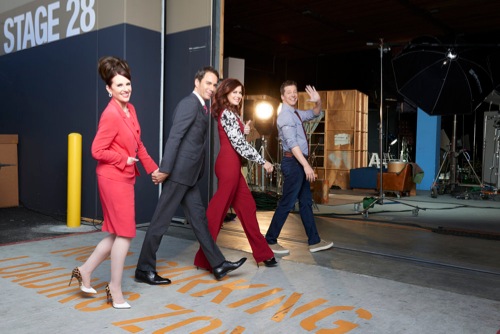
Back for another go-around: the featured foursome of Will & Grace. NBC photo
Premiering: Thursday, Sept. 28th at 8 p.m. (central) on NBC
Starring: Eric McCormack, Debra Messing, Megan Mullally, Sean Hayes
Produced by: Max Mutchnick, David Kohan, Jim Burrows, Alex Herschlag,Tracy Poust, Jon Kinnally
By ED BARK
@unclebarkycom on Twitter
The energy is full force and oftentimes in your face. And the four principals have aged barely a wisp, if it at all, since a May 18, 2006 Will & Grace “finale” supposedly ended their groundbreaking, award-laden eight-season run on NBC.
So never mind all that and nothing’s changed character-wise either. A divorced Grace Adler (Debra Messing) is back with gay Will Truman (Eric McCormack) in his Manhattan apartment while Karen Walker and gay Jack McFarland (Megan Mullally, Sean Hayes) remain bawdy, loud and thoroughly flamboyant.
“What happened to the children you had?” Karen asks Will of his son and Grace of her daughter.
“That never happened,” says Will. The show is more than willing to leave it at that, although Episode 3 does include a guest appearance by Harry Connick Jr. as Grace’s ex-husband Leo.
Back on the original show, they had a daughter named Laila while Will and his partner raised a son, Ben. In the now inoperative finale, Will and Grace were reunited by chance 20 years into the future when they dropped their kids off at college. But as the series returns, erase both kids entirely from the picture. Hey, if you want connective story tissue, go watch Twin Peaks.
What Episode 1 of the Will & Grace reboot does have is a big dollop of Donald Trump. His election is still being applauded by arch Republican Karen, who’s regularly in touch with First Lady Melania.
“By the way, I signed your name to his (the President’s) birthday card,” Karen tells Grace by phone, using her alias of Anastasia Beaverhausen. This prompts the first of two spit takes.
The jokes come at the rate of automatic machine gun fire, and often with predictable outcomes. Melania wants the Oval Office re-decorated, and Karen tells interior designer Grace that she’s recommended her for the job.
“No, I can’t. It would be completely hypocritical,” says Grace.
“Train leaves at 10:30,” Karen tells her. “I’ll be there at 10:15,” Grace assures. And so on.
Will and Jack also preposterously end up in Washington -- in the interests of furthering Will’s giggly crush on a conservative, environment-despoiling congressman. They’re in the Rose Garden at a reception while Grace and Karen are using a bag of Cheetos as a way to match any new Oval Office decor with the President’s coloring. The audience howls.
Episode 1 ends with a rather labored sight gag at Trump’s expense. But some of the tired jokes leading up to this are in part redeemed by the cast’s exuberant delivery of them. It’s a bit like a little kid telling a knock-knock joke. The punch line is usually a groaner, but it’s done with such exuberance that one can’t help but buy into it at least a little.
Episode 2 originates in part from The Cockpit (get it?), where both Will and Jack are interested in younger men. Will hits a home run, in the early going at least, while Jack feels as though he’s getting pretty decrepit.
Karen initially recommends “scrotox” in the interests of an overall youth-ification regime. “One drop of this,” she tells Jack, ”and your old man balls will seem like two shiny pink marbles.”
While Will and Jack try to turn back the clock, Grace and Karen end up trapped, Lucy- and Ethel-like, in a locked shower where the water is steadily rising.
This also is the episode where Will delivers a little sermonette on what his generation of older gay men have endured so that a younger generation can be far more open about their sexuality. Among other things, ”we rightly took Halloween back from the children,” says Will.
(The original Will & Grace likewise blazed trails as the first broadcast network comedy series with two gay characters front and center. Showtime’s Brothers came first, though, even if it couldn’t hope to equal the impact of Will & Grace. Ironically, Brothers originally was offered to NBC as a fall 1983 series. But the Peacock passed and instead chose a comedy about a talking orangutan, Mr. Smith.)
Episode 3 of the new/old Will & Grace is the weakest of those made available for review. Besides the reemergence of Connick Jr.’s Leo, it features Jack teaching an acting class to grade schoolers while Karen grudgingly ends up trying a little tenderness with a kid experiencing her first period.
Whether Will & Grace remains “relevant” isn’t preoccupying either the stars or the show’s returning creators, Max Mutchnick and David Kohan. In league with old-line director James Burrows, they seem intent on merely bringing the funny -- even if it’s often in a vacuum.
Prime-time television has become well-populated with a wide range of gay characters in the 19 years since Will & Grace first joined NBC’s schedule in a Monday night slot between Caroline in the City and Dateline.
The broad histrionics of Will, Grace, Jack and Karen, who are still cavorting before a guffawing live studio audience, at times seem more dated than NBC’s early reluctance to let Will have a same-sex kiss or be seen in bed with another man. But there’s no hesitancy from the actors in terms of re-committing to these roles with a vigor that still drives the series like an old Wild Mouse amusement park ride from back in the day.
NBC already has green lit 16 episodes for this season and another 13 for Season Two. Based on the first three half-hours, “TV’s wittiest ensemble ever” -- as the Peacock immodestly puts it -- won’t be shy about turning up the volume and giving devoted fans of Will & Grace what most of them came for.
“Speaking of gay dinosaurs,” says Will, “let’s talk Madonna.” He’s soon cranking up the volume for her 1983 hit “Borderline” and then dancing into Episode 2’s closing credits with Jack as his partner.
In this case, yeah, they’ve all still got it.
GRADE: B-minus
Email comments or questions to: unclebarky@verizon.net
CBS' Seal Team has David Boreanaz in it -- which is likely all that matters
09/25/17 03:58 PM
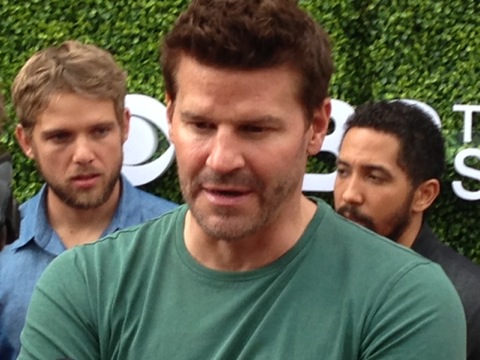
Premiering: Wednesday, Sept. 27th at 8 p.m. (central) on CBS
Starring: David Boreanaz, Jessica Pare, Max Thieriot, Neil Brown Jr., A.J. Buckley, Toni Trucks,
Produced by: Ben Cavell, Ed Redlich, Chris Chulack, Sarah Timberman, Carl Beverly
By ED BARK
@unclebarkycom on Twitter
It’s probably best not to bet against David Boreanaz, who’s had two decades worth of continuous TV series employment in starring roles on Buffy the Vampire Slayer, Angel and Bones.
He strikes again in CBS’ SEAL Team, which will be nestled in a Wednesday night slot between Survivor and Criminal Minds. As noted in the review of NBC’s The Brave, it’s one of the fall’s three new terrorist-fighting military dramas. It’s also numbingly predictable throughout the first two episodes made available for review. And for Boreanaz in particular, it’s the least adventuresome of his four series despite the recurrent, spur of the moment, top secret missions abroad.
Boreanaz plays “Tier One” team leader Jason Hayes, who’s troubled after a recent military operation went too far and resulted in the death of a close friend. It doesn’t help his disposition when he’s ordered to submit himself to questioning by a psychiatrist who hopes to get in touch with his inner feelings. Hayes doesn’t do inner feelings. Maybe that’s why he’s separated from his wife because, well, you know, he was never there for her.
After dispensing with these preliminaries, the team is informed by CIA analyst Mandy Ellis (Jessica Pare from Mad Men) of a sudden prime chance to nab a kingpin terrorist named Abu Samir. “We’re looking for a straight up snatch and grab,” Ellis says before accompanying the team to Liberia.
It’s against Hayes’ better instincts to take cocksure rookie Clay Spenser (Max Thieriot) along with the rest of the seasoned team.
“I’m telling you he’s not ready,” he protests. Which of course means that Spenser will be going and, in the end, causing some problems.
As in Episode One of The Brave, the taking of a woman hostage complicates matters. Can the team both capture Samir and rescue her? A lot of nightcam-lit action and tunnel-skulking ensues before Hayes makes it back just in the nick of time to attend his daughter’s recital.
Episode 2 takes aim at a chemical weapons factory where there’s also an unexpected complication, this time involving children. Spenser doesn’t get to go along on this one. Instead he’s back home doing more training and also coming on to a teacher at a bar. She initially brands him a sexist knuckle-dragger, which means that this relationship will blossom in due time.
The other Tier One members are Hayes’ “trusted confidant” Ray (Neil Brown Jr.), the loyal but possibly self-destructive Sonny (AJ Buckley) and Davis (Toni Trucks), a combination logistics officer and den mother.
In dramas such as these, “official orders” are made to be disregarded for whatever is perceived as the greater good. Hayes, who has developed a bit of a jangled nerve hand twitch, can always be counted on to do the inherent right thing while also prototypically shouting “We gotta move now now now now now!”
At the now somewhat advanced age of 48, Boreanaz has his leading man bonafides down pat. Jim Caviezel (Person of Interest) initially had this lead role, but when a guy like Boreanaz becomes available, it’s an easy call to re-cast.
Just don’t expect much more than Boreanaz’s command presence in SEAL Team. You’ll see where it’s going long before it gets there, no matter how far off the missions might be. But yeah, it’ll probably run at least five seasons.
GRADE: C
Email comments or questions to: unclebarky@verizon.net
The Menendez Brothers get another whirl, this time with NBC's Law & Order attached
09/25/17 12:08 PM
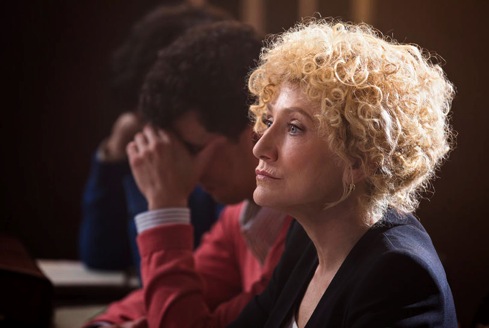
Premiering: Tuesday, Sept. 26th at 9 p.m. (central) on NBC
Starring: Edie Falco, Anthony Edwards, Miles Gaston Villanueva, Gus Halper, Josh Charles, Sam Jaeger, Cliff Chamberlain, Carlos Gomez, Lolita Davidovich, Constance Marie
Produced by: Dick Wolf, Rene Balcer, Peter Jankowski, Arthur W. Forney
By ED BARK
@unclebarkycom on Twitter
Yes, the Menendez murders have been “done” before, dating back to a pair of spring 1994 productions on Fox and CBS, and resuming this year with a two-hour ABC documentary and a scripted Lifetime movie.
No, that lamentably doesn’t mean enough is enough. The “true crime” genre remains a hot TV commodity, so NBC is taking its turn with the eight-episode Law & Order True Crime: The Menendez Murders.
Previous Menendez movies and miniseries have featured “name” actresses in the role of ill-fated Kitty Menendez, who was played in order of appearance by Jill Clayburgh, Beverly D’Angelo and then Courtney Love in June on Lifetime. This go-around is fronted by Edie Falco of The Sopranos and Nurse Jackie fame>. She sports frizzy hair and a hard-bitten demeanor as defense attorney Leslie Abramson.
The other big name is behind the camera in the person of Dick Wolf, who dominates NBC as no producer has since the late Aaron Spelling populated ABC with the likes of Charlie’s Angels, Dynasty, The Love Boat, Fantasy Island, Hart to Hart, T.J. Hooker, etc.
Wolf long has been more of a workman than a craftsman, so Menendez Murders is by the book, a k a the well-worn Law & Order bible. The only real difference this time out is that the headline-ripping is real rather than a transparent mockup using fictional names and slightly altered narratives.
In August 1989, Lyle and Erik Menendez (Miles Gaston Villanueva, Gus Halper) brutally murdered their wealthy parents in their Bel Air home. The father, Jose (Carlos Gomez), turned out to be an abusive intimidator while Kitty (Lolita Davidovich this time out) had deteriorated into an enabling basket case. During its planned limited run of eight episodes, beginning with a slo-mo re-creation of the killings, Menendez Murders chronicles what led to this, that and that before the brothers were convicted and sent to prison, where they remain. For a little extra hammer and tong symbolism, Tuesday’s opening episode shows a TV screen being splattered with blood just as Charlton Heston’s Moses from The Ten Commandments is intoning, “Behold His mighty hand.” Perhaps he meant “heavy hand.”
The first two hours depict dogged detectives Les Zoeller and Tom Linehan (Sam Jaeger, Cliff Chamberlain) piecing things together while Lyle tries to keep his guilt-ridden younger brother Erik from going off the rails. “Guns, pills and money. What could possibly go wrong here?” Zoeller asks/says sardonically.
Falco’s Abramson drops in and out initially as a workaholic courtroom addict who immediately deduces “Those boys did it” upon seeing them in news footage for the first time. But by the end of the second episode made available for review, she’s telling weepy Erik that “I will not let you get rolled over” before meeting the press in the interests of building a self-defense case for the accused.
Falco is fine in this role and Jaeger brings some nice touches to the role of detective Zoeller. Josh Charles (The Good Wife) adds a little extra marquee value as the brothers’ compromised psychiatrist, Dr. Jerome Oziel. His spurned, blackmailing mistress, Judalon Smyth (Heather Graham), also happens to be an unhinged patient who turns Oziel on when calling him “Dr. Daddy.”
Menendez Murders deploys the trademark Law & Order “Dun Duns” as scene-bridgers to reinforce “The Brand.” New revelations are promised, of course. “The research revealed things that none of us knew,” Wolf told TV critics during this past summer’s Television Critics Association press tour. “Your mind is going to receive information that I think will change a lot of peoples’ attitudes.”
More to the actual point, though, Menendez Murders hits the true crime genre’s sweet spot with “love, lust, lying cheating,” Wolf said. “Basically all seven deadly sins in one place.”
Just don’t expect any style points or departures from the straight ahead Wolf playbook. He’s an accomplished pro at pro forma. And if this one works, there’s really no limit to what else can be replayed yet again -- and again.
GRADE: B-minus
Email comments or questions to: unclebarky@verizon.net
It's not rocket science: Young Sheldon takes flight as a near-perfect prequel to Big Bang
09/21/17 11:54 AM
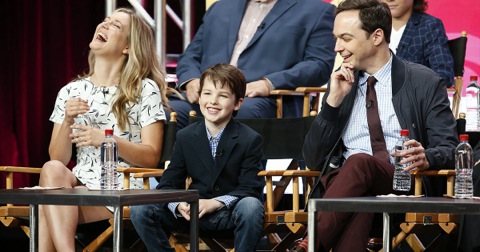
Young Sheldon stars Zoe Perry, Iain Armitage, plus narrator Jim Parsons, at the Television Critics Association summer “press tour.” CBS photo
Premiering: Monday, Sept. 25th at 7:30 p.m. (central) on CBS with a special preview before moving to Thursdays on Nov.2nd
Starring: Iain Armitage, Zoe Perry, Lance Barber, Raegan Revord, Montana Jordan, Annie Potts, with voice-overs by Jim Parsons
Produced by: Chuck Lorre, Steven Molaro, Jim Parsons, Todd Spiewak
By ED BARK
@unclebarkycom on Twitter
Intentionally patterned after The Wonder Years, CBS’ spinoff of The Big Bang Theory sticks its landing with impeccable casting, sharply funny dialogue and a distinctly different vibe than the long-running mothership.
The fall season’s best new comedy, set in the fictional East Texas town of Medford circa 1989, has its own charm and a breakout kid star in Iain Armitage as brainy, persnickety nine-year-old high school freshman Sheldon Cooper. He’s very winningly assisted by former child actor Zoe Perry (Laurie Metcalf’s daughter) as his nurturing mom Mary. They’re immediately attuned to one another in Monday’s sneak preview pilot episode. After that, Young Sheldon has a five-and-half-week respite before returning Nov. 2nd in a Thursday slot following Big Bang.
This is executive producer Chuck Lorre’s first and so far only “single-cam” comedy without either a laugh track or “live studio audience” component. He says it’s been a tough transition for him after creating and producing a string of “multi-cam” sitcom hits, including Big Bang, Two and a Half Men and Mom. But there’s no indication of that in Young Sheldon’s first episode, which begins with narrator and Big Bang star Jim Parsons telling viewers that “I’ve always loved trains” while his pre-teen self plays with one.
Sheldon also is very fond of bow ties and Radio Shack (subject of a terrific episode-ending joke), has a germ phobia at the family dinner table and is fastidious about adhering to his high school’s official dress and conduct codes.
“Lord, look after my son. Don’t let him get stuffed in a gym bag,” mom says under her breath while driving Sheldon to his first day of class.
As in The Wonder Years, Sheldon has an older brother who just wishes he’d go away. His name is Georgie (Montana Jordan) and he’s named after his football coach father (Lance Barber). A second antagonist is Sheldon’s tart-tongued twin sister Missy (Raegan Revord), who assures him he’s gong to get his “ass kicked” at his new school, where poor Georgie has to share classes with him. He vents his pent-up frustrations on the football field in one of the first episode’s occasional serious moments.
Look closely and you’ll also see a cameo by Bob Newhart, who’s guested on Big Bang as one of Sheldon’s childhood heroes, “Professor Proton.” New series regular Annie Potts isn’t in the pilot, but has been added as what CBS publicity materials describe as Sheldon’s “beloved Meemaw, his foul-mouthed, hard-drinking Texas grandmother.”
She supposedly appreciates her grandson’s “unique gifts,” but East Texas as a whole does not. “The only Newtons they cared about were Wayne -- and fig,” narrator Parsons sniffs at the start after referencing famed physicist Isaac Newton. Let’s subtract a point or two for condescension, although it quickly passes.
Sheldon’s dad may not know an isotope from a popsicle, but he’s not a lunkhead, either. Barber’s George Sr. instead is a decent sort who tries to relate to his younger, brainy son and contributes his own warm moment near episode’s end. All in all, this is the most appealing new set of TV parents since ABC launched The Middle back in September 2009.
Young Sheldon ends up having a mind of its own, even if it’s a prequel to a long-established hit. Armitage and Perry in particular are a perfect pair as precocious son and protective but not overbearing mom. There’s an awful lot to like here, with high expectations not only met but exceeded.
GRADE: A-minus
Email comments or questions to: unclebarky@verizon.net
CBS' time-spanning Me, Myself & I seems to be in too much of a hurry
09/21/17 10:01 AM
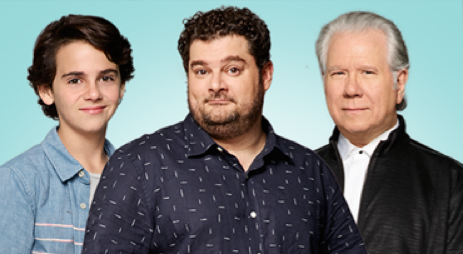
Premiering: Monday, Sept. 25th at 8:30 p.m. (central) on CBS
Starring: Bobby Moynihan, John Larroquette, Jack Dylan Grazer, Jaleel White, Kelen Coleman, Brian Unger, Christopher Paul Richards, Skylar Gray, Mandell Maughan, Reylynn Caster, Sharon Lawrence
Produced by: Dan Kopelman, Aaron Kaplan, Dana Honor
By ED BARK
@unclebarkycom on Twitter
Perhaps CBS should add “This Is Us Presents” to the title of its new time-traveling, generation-spanning comedy.
Me, Myself & I is similar in concept if not execution. It’s decently crafted, devoid of an irritating laugh track and has a quartet of familiar TV faces in Bobby Moynihan, John Larroquette, Jaleel White and Sharon Lawrence. But Monday’s premiere episode, which is all that’s available for review, oddly seems to resolve just about everything of consequence in a half-hour’s time.
Add this: Moynihan, Larroquette and Jack Dylan Grazer (now appearing in the new feature film version of Stephen King’s It) look nothing alike even though they’re playing the same character, Alex Riley. Our looks change as time marches on, but this is like morphing from Frankie Muniz into Kevin James into Christopher Walken.
Grazer plays 14-year-old Alex, an only child and devoted Chicago Bulls fan who’s uprooted to Los Angeles when his mother, Maggie (Mandell Maughan), gets remarried to a pilot named Ron (Brian Unger).
Forty-year-old Alex (Moynihan), who has a pre-teen daughter named Abby (Skylar Gray), is newly divorced and soon down on his luck after catching his wife (guest star Allison Tolman) cheating on him.
Sixty-five-year-old Alex (Larroquette) is a multi-millionaire businessman who decides to retire after suffering a heart attack. At this point, adult Abby (Kelen Colman) has become general manager of Alex’s beloved Bulls.
Pilot Ron turns out to be a very good, supportive guy, and his son, Justin (Christopher Paul), is a nice kid, too. So there’s not a lot of conflict here, except when Alex’s heart is broken via an unfortunate occurrence at the school dance while he’s dreamily dancing with his seemingly unattainable dream girl, Nori Sterling (Reylynn Caster and in later years, Lawrence).
We’ve got one more square to fill. Mid-life Alex’s best friend is Darryl (White), in whose garage he’s living while trying to invent a product that will make him rich. “When I grow up, Im gonna come up with an idea that changes the world!” young Alex has already declared.
Well, by episode’s end, the various stages of Alex are either newly triumphant or unexpectedly fulfilled by a chance meeting. And unlike This Is Us, there’s no attendant mystery over how and when a pivotal character dies.
In other words, Me, Myself & Irene appears to have boxed itself in. The opening episode is pleasant enough to watch, although not really very amusing. But the prospects for a sustainable series seem highly limited by all that unfolds here. Maybe Alex, Alex and Alex can still pull off some revelations in terms of how they get to where they’re going. The show’s mantra is to “keep shooting,” just like Bulls legend Michael Jordan did. But the degree of difficulty going forward looks to be more like a half-court shot than a layup. Go ahead, though. Surprise me.
GRADE: C+
Email comments or questions to: unclebarky@verizon.net
ABC's The Good Doctor is both an autistic and artistic triumph
09/20/17 02:36 PM
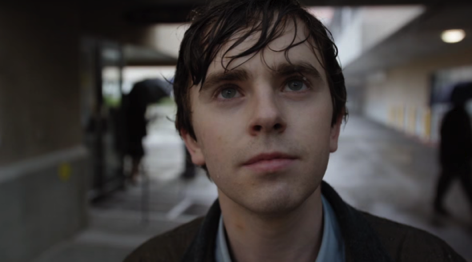
Freddie Highmore stars as an autistic surgeon in The Good Doctor. ABC photo
Premiering: Monday, Sept. 25th at 9 p.m. (central) on ABC
Starring: Freddie Highmore, Antonia Thomas, Nicholas Gonzalez, Chuku Modu, Hill Harper, Beau Garrett, Richard Schiff
Produced by: David Shore, Daniel Dae Kim, David Kim, Sebastian Lee, Seth Gordon
By ED BARK
@unclebarkycom on Twitter
After playing Norman Bates for five years on A&E, Freddie Highmore knows what it is to have an out-of-body mind of his own.
Norman was bent, spindled and mutilated. But autistic surgical resident Shaun Murphy is mental without being disturbed in ABC’s affecting The Good Doctor. Monday’s premiere is a case study in how to build empathy for your lead character without getting all mushy about it.
Young Shaun’s “savant syndrome” potentially makes him a medical marvel, but without a halo. As deftly played by Highmore, he’s innocently sweet-tempered, but also cuts to the chase and can cut his “superiors” down to size when the occasion demands.
Adapted from a same-named 2013 South Korean series, The Good Doctor is shepherded in large part by co-executive producer Daniel Dae Kim. He previously worked for ABC as a co-star on Lost before clashing with CBS over his demand that he be paid the same salary as Hawaii Five-0 co-stars Alex O’Loughlin and Scott Caan.
That didn’t happen, so Kim left the series after seven seasons to further advance his fledgling 3AD production company, which is partnering with ABC after CBS programmers earlier passed on The Good Doctor. They may well end up regretting that.
The show clicks from the very start, with self-sustaining Shaun going through his presumably unvarying morning routine before leaving his hometown of Cheyenne, Wyoming and quickly landing in San Jose, CA, home of St. Bonaventure Hospital. He comes upon a kid soccer match while still in Cheyenne, prompting a memory of being beaten on that field as a child before his true-blue brother came running to his rescue.
A medical emergency then quickly takes hold after an eight-year-old boy is hit by a falling San Jose airport sign being installed by workmen. An older doctor intercedes, but puts pressure on the wrong spot to stop heavy bleeding from the child’s jugular vein. “You’re killing him” by stopping his breathing, Shaun says calmly. He then takes over.
Scenes of his highly improvised ways to rig up life-saving devices are intercut by an animated debate among St. Bonaventure’s hierarchy. It turns out that the hospital’s president, Dr. Aaron Glassman (Richard Schiff in potentially his best role since The West Wing), made a unilateral decision to hire Shaun. Now he’s facing strong opposition.
“He’s not Rainman. He’s highly functioning,” Glassman pleads. “He sees things and analyzes things in ways that are just remarkable. In ways that we can’t even begin to understand.”
Dr. Marcus Andrews (Hill Harper) is among those having none of this. Meanwhile, in an unfortunate Grey’s Anatomy-ish lapse, doctors Jared Kulu and Claire Brown (Chuku Modu, Antonia Thomas) are shacking up in his rest area. It’s why she hasn’t been answering her pages. Oh well, what’s the worst that could happen -- someone dying?
The Good Doctor continues to toggle between the hospital and airport while also periodically flashing back to the tragically short-lived but lasting bond Shaun forged with his brother. “Never forget, you’re the smart one, and can do anything,” Shaun was assured.
Things eventually converge at St. Bonaventure, with Shaun insisting that his patient needs an “echo-cardiogram” while the staff doctors all think he’s daft. Among them is head of surgery Dr. Neal Melendez (Nicholas Gonzalez), an imperious sort who also happens to be a hunk.
Shaun emerges triumphant, of course, but the “you don’t belong here” rebuffs are only beginning.
Highmore plays his lead role to near-perfection amid all the considerable medical jargon and jockeying for position among his supposedly more enlightened colleagues. The Good Doctor engagingly drops Dr. Shaun in their midst as both a lamb and a lion with a muted roar. The story possibilities are readily apparent on a number of fronts in the best broadcast network medical drama since Hugh Laurie contrastingly bruised his way through House.
GRADE: B+
Email comments or questions to: unclebarky@verizon.net
NBC's The Brave force marches its way through international terrorism
09/20/17 09:38 AM
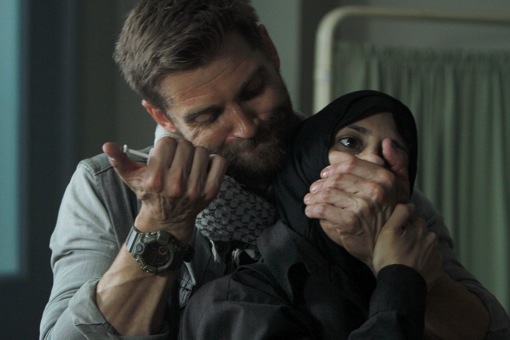
Premiering: Monday, Sept. 25th at 9 p.m. (central) on NBC
Starring: Mike Vogel, Anne Heche, Natacha Karam, Demetrius Grosse, Noah Mills, Sofia Pernas, Tate Ellington, Hadi Tabbal
Produced by: Dean Georgaris, Matt Corman, Chris Ord, Avi Nir, Alon Shtruzman, Peter Traugott, Rachel Kaplan
By ED BARK
@unclebarkycom on Twitter
Three broadcast networks figure they can’t go wrong this fall by fighting heartless, soulless terrorists in new hard-charging combat dramas.
NBC is first to the battle front with The Brave, which premieres on Monday, Sept. 25th in a to-die-for time slot following The Voice. CBS’s Seal Team is just a few steps behind with a Wednesday launch while The CW’s Valor must wait until Oct. 9th for its marching orders.
“People like this are why we come to work every day,” says The Brave’s order-issuing, safe at home ringmaster. Her title is deputy CIA director, her name is Patricia Campbell, and she’s not referring to tracking down Twitter trolls.
Anne Heche plays the role in notably heavy makeup, but still in grieving mode. Her son was killed in combat just 10 days earlier, leaving Campbell with a heavy heart upon returning to the business of exterminating the world’s vermin and rescuing their captives.
First up is Dr. Kimberley Wells (guest star Alix Wilton-Regan), who’s nobly a part of the Doctors Without Borders team in Damascus, Syria before being kidnapped while talking to her husband back home.
Special Ops squad Capt. Adam Dalton (Mike Vogel) and his dedicated but sometimes sniping team of undercover specialists are immediately summoned from their base in Turkey. They must be “wheels up within the hour” because the hostage-takers aren’t interested in ransom demands. Instead “they chop off heads,” Campbell says, in this case as revenge for the recent presumed slaying of a terrorist kingpin known to U.S. forces as “Baghdadi.”
Unfortunately for the taut drama at hand, “Baghdadi” sounds funnier each time his name is invoked, which turns out to be a lot down the stretch. Not to spoil the obvious, but some terrorists have unbelievably amazing recuperative powers, as do their wives.
The Special Ops team also includes cocky, condescending Joseph “McG” McGuire (Noah Mills), who’s prone to taking verbal shots at fellow operatives Jasmine “Jaz” Khan (Natacha Karam) and Amir Al-Raisani (Hadi Tabbal).
Asked derisively by McG if she was “raised a Muslim,” she retorts, “I was raised a New Yorker.” He’s briefly chastised but later doesn’t think much of Amir’s prayer rug.
Ezekiel “Preach” Carter (Demetrius Grosse) is the other Special Ops risk-taker while domestic front CIA analysts Noah Morgenthau (Tate Ellington) and Hannah Rivera (Sofia Pernas) dig out invaluable information on who’s who and their whereabouts. Whatever the case, Campbell is steeled by the certainty that “we are fighting people that want to wipe us off the planet. That means we have to be as ruthless as they are.”
As in the first episode of Seal Team, rescuing a woman held hostage ends up intersecting with bigger fish in the grand global scheme of things. Can the team pull off two missions at once? Will there be “go go go go” derring-do in the process? Suffice it to say that no self-respecting, heroic anti-terrorist team will ever submit solely to the “greater good” if it might mean leaving a terrorized hostage behind. Get it? Got it? Good.
Vogel is solid as The Brave’s hero among heroes, as are the show’s production values. But Heche initially seems ill-suited to the task of being a taskmaster. She recurrently looks distraught or shaken in the line of duty. Even seasoned professionals, of course, can be deeply affected by the loss of a child. Which also begs the question of why on earth Heche’s Campbell is back so soon in this unforgiving, pressure-cooker of a job.
NBC made just the pilot episode available for review. In the following week, according to the network’s storyline description, the Special Ops team heads to Russia after a CIA officer is “attacked by rebels.”
The opening hour ends with an unexpected, big boom of a cliffhanger designed to bring viewers back for more. In that it’s unique. Otherwise The Brave is broad-stroked and pro forma in highly volatile times both at home and abroad. On network television at least, international terrorism indeed can be thwarted on a weekly basis via The Brave, Seal Team and Valor. Take that, “Baghdadi.” Take notice, “Rocket Man.”
GRADE: C
Email comments or questions to: unclebarky@verizon.net
Prime-time Emmys pound away at Trump (and also give away some awards)
09/18/17 11:46 AM
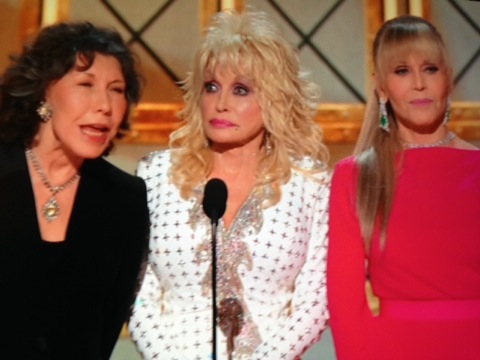
By ED BARK
@unclebarkycom on Twitter
Let’s first dispense with the night’s biggest winners before turning to the real headline-maker from Sunday’s 69th annual Prime-Time Emmy Awards on CBS.
Hulu’s The Handmaid’s Tale and HBO’s Big Little Liars were the top trophy-takers with five each, including respective nods as best drama and best limited series. NBC’s Saturday Night Live finished close behind with four Emmys while HBO’s Veep and its star, Julia Louis-Dreyfus, continued their winning streaks.
Dreyfus was voted best actress in a comedy series for the sixth straight year, making her the all-time Emmy winner for playing a single role, in this case vainglorious vice president/president/ex-president Selina Meyer. Candice Bergen won five Emmys as the star of CBS’ Murphy Brown. Veep also three-peated as best comedy series.
Little of this is likely to resonate above and beyond Sunday night. That’s because the three-hour ceremony, hosted by Stephen Colbert, will be better remembered as a night-long demolition of Donald Trump, who so far has declined Colbert’s opening invitation to tweet any response. It was the most politically charged Emmy telecast since the 1992 ceremony, when Vice President Dan Quayle took a verbal beating for his pointed criticisms of Murphy Brown after its lead character had a baby out of wedlock.
“Boy, Quayle is just getting stomped here,” co-host Dennis Miller said near the end of that year’s Emmys, which also took some sharp jabs at President George H.W. Bush and the problematic Reagan family dynamics of those days. But these were love taps compared to Sunday’s Trump-athon.
Louis-Dreyfus happily joined in the festivities after first promising an eventful and funny final season of Veep. “We did have a whole story line about impeachment,” she said, “but we abandoned that because we were worried that someone else might get to it first.” The audience whooped loudly in approval.
Earlier in the night, Jane Fonda and Lily Tomlin went political as no presenters ever have during their “reunion” with Dolly Parton 37 years after they made the feature film 9 to 5 together.
In 1980, “we refused to be controlled by a sexist, egotistical, lying, hypocritical bigot,” Fonda began, referring to the tyrannical office boss played by Dabney Coleman.
“And in 2017, we still refuse to be controlled by a sexist, egotistical, lying, hypocritical bigot,” Tomlin added to cheers and applause.
Caught in the middle, a stunned-looking (see above photo) Parton wanted no part of this, instead falling back on a couple of trademark jokes about her breasts.
Colbert began tamely with a song and dance number featuring the refrain, “Everything is better on TV.” After a traditional host jab at the assembled Hollywood swells -- “Us celebrating us. Tonight we binge ourselves” -- Colbert at first gently waded into Trump by noting there’s way too much television to be watched by any single person -- except the President, apparently.
Like it or not, Trump is the biggest star of the year -- “and Alec Baldwin, obviously,” Colbert said of the actor who later won an Emmy for his numerous SNL send-ups of the President. “You guys are neck and neck. And Alec, you’re up against a lot of neck.”
“You can’t deny,” the host added, “that every show was influenced by Donald Trump in some way.” But he named only two -- House of Cards and American Horror Story: Cult -- before citing “next year’s Latin Grammys, hosted by Sheriff Joe Arpaio,” whom Trump recently pardoned.
Trump’s former NBC “reality-competition” series, The Apprentice, was twice nominated for Emmys, but never won, Colbert noted.
“Why didn’t you give him an Emmy?” the host wondered. “I tell you this, if he had won an Emmy I bet he wouldn’t have run for President. So in a way, this is all your fault. I thought you people loved morally compromised anti-heroes” (such as Breaking Bad’s Walter White). “He’s just Walter much whiter.”
Trump has never forgiven the Academy for this snub, Colbert said, offering stunning real-life proof in a clip from one of his debates with Hillary Clinton. When she upbraided him for contending that even Emmy voting was rigged against him, Trump said,” I shoulda gotten it.”
“But he didn’t,” Colbert said, building to a big finish. “Because unlike the presidency, Emmys go to the winners of the popular vote.”
This predictably received one of the night’s bigger roars of approval, promoting Colbert to seemingly ad lib, “Where do I find the courage to tell that joke in this room?”
It had been a very long monologue that also included a game assist after Colbert displayed a 2014 Trump tweet in which he said Seth Meyers would be a “total joke” as that year’s Emmy host because “he is very awkward with almost no talent. Marbles in his mouth!”
Did Meyers have a response? Seated in the audience, he let a mouthful of marbles spill out. It would have been the sight gag of the night, save for what quickly followed when Colbert asked no one in particular, “Is there anyone who can say how big the (Emmy) audience is?”
Out came deposed White House press secretary Sean Spicer and a podium on wheels. “This will be the largest audience to witness the Emmys -- period,” he said, lampooning his grandiose estimates of the crowd for Trump’s inauguration address. “Both in person and around the world.”
The camera then caught Melissa McCarthy, who last week won a guest comedy actress Emmy as “Spicy” on SNL. She seemed hesitant to applaud, but grudgingly did so. A bit later in Sunday’s ceremony, Colbert referred to HBO’s The Wizard of Lies as “The Sean Spicer Story” after noting that its nominated star, Robert De Niro, was in the audience. For the record, De Niro played ponzi scheme crook Bernie Madoff, but didn’t win. The Emmy instead went to Riz Ahmed for The Night Of on a night when diversity and television’s surge in quality roles for women were celebrated during those times when Trump wasn’t being filleted.
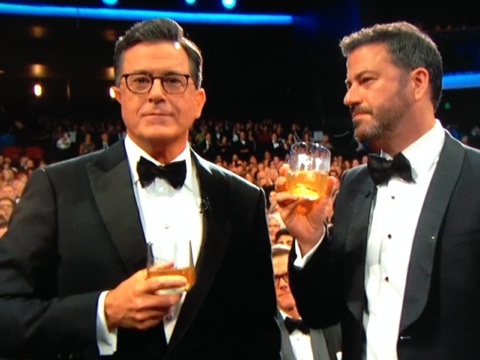
Colbert’s CBS Late Show joined De Niro and many others in the losers’ circle while HBO’s Last Week Tonight with John Oliver won two Emmys.
The host and Jimmy Kimmel, also a nominee, commiserated by drinking Emmy’s faux signature cocktail, “The Last Week Tonight.”
“It’s so high quality, apparently they can only make one a week,” Colbert said tartly.
“Mine has extra bitters in it,” Kimmel added.
Colbert’s CBS Late Show rose to No. 1 in the after-hours total viewer ratings after he began devoting almost all of his opening monologues to ridiculing Trump. But this rather surprisingly didn’t pay off on Emmy night, even though Oliver’s triumphant Last Week Tonight also is anything but shy about ripping Trump in its weekly half-hours.
Donald Glover, creator and star of FX’s Atlanta, notably took home two Emmys for acting and directing. After winning for acting, Glover credited the President with an assist: “I want to thank Trump for making black people number one on the most oppressed list. He’s the reason I’m probably up here.”
He also was the primary reason for SNL’s big haul, which included acting Emmys for Baldwin and Kate McKinnon plus a statue for best variety/sketch series.
“I suppose I should say, ‘At last long last, Mr. President, here is your Emmy,’ “ Baldwin jabbed before somewhat joking that wearing an orange wig as Trump seemed to be the equivalent of birth control. In his particular case, it stopped a streak of Baldwin and his wife having three children in three years, he said.
Trump supporters can and no doubt will use the latest Emmys as proof positive that Hollywood is out of touch with “the real world” -- or whatever it’s called these days in our super-polarized times. From this view, the Trump beat-down was predictable, but maybe not to this extent. And it ate away at the value of the awards themselves, which are not what people will be talking about on a night when Colbert also chipped in with a brief filmed interrogation by Westworld co-star Jeffrey Wright.
“Have you ever questioned the nature of your reality?” a bow-tied but otherwise “naked” Colbert was asked.
“Every day since November 8th,” he replied.
Mopping up, here are a few non-Trump developments from “television’s biggest night.”
*** Host network CBS and two of the other Big Four broadcast networks, ABC and Fox, went away empty-handed. But NBC ran second overall with six Emmys while HBO led with 10. Besides the four nods to SNL, the Peacock’s The Voice won as best “reality-competition” series while Sterling K. Brown received a best lead actor in a drama series Emmy for This Is Us.
*** Hulu, part-owned by NBC Universal, won its first major Emmys ever, all five of them for The Handmaid’s Tale. Besides the best drama series trophy, star Elisabeth Moss got to the winner’s circle for the first time in nine tries.
*** HBO’s Big Little Lies was its biggest winner while the premium cable network’s Westworld (which tied SNL for the most overall Emmy nominations with 22), went without any major wins. FX’s Feud: Bette and Joan and Netflix’s Stranger Things, both with 18 nominations, also were shut out in terms of the 27 major Emmys distributed Sunday night.
***Just five networks -- HBO, NBC, Hulu, Netflix and FX -- collected all of the Emmy hardware during the Academy’s main event.
A complete list of Sunday night’s major winners can be found here.
Email comments or questions to: unclebarky@verizon.net
Cinemax's Mike Judge Presents: Tales From the Tour Bus ties one on with country's most self-destructive stars (most now dead)
09/14/17 02:55 PM

Johnny Paycheck is hell-bent as usual in Tales From the Tour Bus. Cinemax photo
Premiering: Friday, Sept. 22nd at 9 p.m. (central) on Cinemax
Hosted by: Mike Judge
Produced by: Mike Judge, Dub Cornett, Richard Mullins
By ED BARK
@unclebarkycom on Twitter
Hey network execs, just don’t say no to Mike Judge.
Ya hear? Just don’t. Because no matter how crazy it might sound, whatever he pitches you almost assuredly is destined to be an enduring, buzz-worthy, singular vision. Hell, you should be standing in line waiting for him to tell you just what it is.
The Austin-based mind behind Beavis and Butt-head, King of the Hill, Office Space, Idiocracy and Silicon Valley is going his own way again with Mike Judge Presents: Tales From the Tour Bus. The half-hour animated series, with archival footage also dropped in, has received an eight-episode order from Cinemax. It launches on Friday, Sept. 22nd as a reasonably fond look at some of country music’s most celebrated and talented self-destructive forces, most of them now dead.
Judge narrates the episodes and also hosts them in animated form for a few seconds at the beginning. An opening printed disclaimer says it’s all “about real people and real events. However, due to the passage of time and, in some cases, controlled or illicit substances, details of some tales are a bit hazy.”
The first episode’s specimen is Johnny Paycheck, real name, Donald Lytle. His mega-selling anthem, at least in blue collar America, was “Take This Job and Shove It.”
Judge wonders if whoever’s watching has ever heard of Paycheck. He answers his own question: “No? You don’t like country music, do ya? You think it’s corny and twangy and kinda stupid. Well, you could be right, but it’s always good to keep an open mind.”
The beautiful setup continues, with Judge noting that Paycheck sold 10 million records in his day, equaling the sales of NWA and Gwen Stefani. Matter of fact, he was watching TV one day when he came upon a news story railing about the violence associated with both NWA and gangsta rap in general.
“I got tired of watching this because I actually like NWA and gangsta rap,” says Judge. So he switched over to a country music channel and saw Paycheck being interviewed shortly after he got out of jail for “shooting a guy. And I thought, ‘Why isn’t anyone worried about Johnny Paycheck? Why isn’t Connie Chung picking on him?’ ”
And away we go, with real life friends and associates of the highly volatile Paycheck first seen as their actual selves before morphing into tale-telling cartoon characters. In the Paycheck saga, much of the telling is by the chortling Adams brothers, Gary, Arnie and Don. They were Johnny’s backup band and it was never dull. Squint, and you might see these guys as stand-ins for King of the Hill’s gossiping good ol’ boys.
For a while, until he fired ‘em, the Adams brothers also backed up George Jones, whose tempestuous marriage and singing career with man-hungry Tammy Wynette is recounted in Episodes 3 and 4 of Tales.
So the Adams trio will be back, and don’t expect me to keep sorting ‘em out. In the Paycheck tale, they all laugh it up after remembering him once saying, “There’s nothing worse than a hillbilly with a hit record.”
In reality, there’s nothing inherently funny about Paycheck’s lifelong bouts with the bottle, his latter day cocaine habit and his violent tendencies. But he somehow managed to last until 2003, when he died at age 64. And the Adams brothers and others are simply telling it like he was with both affection and resignation.
“Paycheck had a way of destroying himself every five years,” one of the brothers says before another adds that he had about four of those cycles.
You’ll also meet one of Paycheck’s musical collaborators, an African-American man known as Swamp Dogg, real name Jerry Wiliams Jr.
“He coulda been a Crip -- very easily,” Swamp Dogg says in reference to a notorious L.A. gang.
Paycheck in fact did hang out with the Hell’s Angels, and once recorded an album titled “Armed and Crazy.”
Episode 2 chronicles another wild man, Jerry Lee Lewis, a vintage rock performer with two smash hits -- “Whole Lotta Shakin’ Goin’ On” and “Great Balls of Fire” -- before he later turned to country music.
“The Killer,” as he proudly called himself, might have been the “The King” instead of Elvis “had he not married his 13-year-old second cousin,” says the man who signed him to his first Sun Records contract.
Yeah, that didn’t help. Her name was Myra Gale Brown, who in animated form says, “I was the thinking adult in that relationship.”
Lewis shared Paycheck’s fondness for firearms, and once shot his bass player in the shoulder after he demanded to be paid. The victim survived, and it was later ruled accidental.
Here’s a guy who also didn’t like it much when his hangers-on fell asleep rather than continue to party with him. As one tale has it, he sprayed machine gun fire in their vicinity to wake them all up and later tommy-gunned a big rack of false teeth. Lewis also drove his car through the closed gates of Graceland in hopes of keeping a promise to visit a distraught Elvis. And on it went, with Lewis somehow still ticking at age 81. At current count, he’s been through seven wives.
Then there’s the late George Jones, blessed with one of country music’s greatest voices -- and worst temperaments. In that he replicated Paycheck. The two of ‘em used to fight all the time in the early years, says one of the Adams brothers.
Wynette idolized him from afar, enduring two miserable marriages and birthing three children before she and Jones forged a powder keg of a marriage while also becoming a hugely successful country singing duo. Jones liked to begin his day with a couple of Bloody Marys for breakfast, switch to beers at lunch and then move on to whiskey, an associate recalls.
One of his drinking buddies was Waylon Jennings, (subject of Episodes 6 and 7). This regularly didn’t end well, such as the night when Jones called Jennings a “Conway Twitty singin’ sonofabitch” before Waylon took him outside, roped him to a tree and left him there.
Jones eventually became infamously known as “No Show Jones” for blowing off concert engagements.
“This was a guy who just didn’t give a damn,” says “gonzo” journalist Jimmy McDonough.
But Wynette endured him for quite a while, with her signature hit, “Stand By Your Man” devoted to Jones. Their six-year marriage came to a close after Jones terrorized Wynette in their home and at one point fired a shotgun at her.
Wynette, who died in 1998 at age 55, always wanted a man by her side, though, and for a while took up with Burt Reynolds. She also began recording with Jones again, rationalizing that “we may not can live together, but he can still make me cry hearin’ him sing.” In later years and until her death, she voiced Hank Hill’s mom, Tilly, on King of the Hill.
This barely scratches the surface of Tales From the Tour Bus, which makes for some awfully dark half-hours of television if you really think about it.
But Judge goes about this business in a manner that doesn’t make one want to unduly ruminate or judge. No one’s being held up to ridicule -- not wholly intentionally at least. These are people with talent to burn and seriously damaging character flaws that ended up burning most of them out. But no one wants to know about the times they went to church. That doesn’t make for much of a story. Instead they want to know about the time that a very worse for wear Jones banished his imaginary duck friend from his tour bus, only to . . .
Well, you’ll just have to watch. And you know what? You really should. Although damned if I sometimes don’t know just why.
GRADE: B+
Email comments or questions to: unclebarky@verizon.net
Ken Burns' The Vietnam War brings it all back home in ways his other films never have
09/13/17 12:25 PM
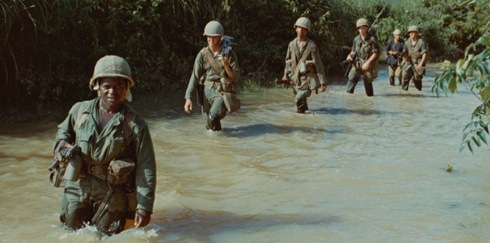
Premiering: Sunday, Sept. 17th at 7 p.m. (central) on PBS (KERA13 locally) and continuing Sept. 18-21 and Sept. 24-28 at the same time
Produced by: Ken Burns, Lynn Novick
By ED BARK
@unclebarkycom on Twitter
Going against the grain of their usual approach, Ken Burns and producing partner Lynn Novick have seen to it that historians, sociologists and other assorted academics are kept out of The Vietnam War.
The history is still too recent and raw for that. Others don’t have to tell you what people may or may not have been thinking. In this monumental 18-hour, 10-part undertaking, it’s the participants speaking for themselves in ways that cut deep and keep reverberating. Hello darkness, my old friend. I’ve come to talk with you again. In terms of the destructive, divisive, decibel-shattering “Living Room War,” sounds of silence have never been much of an option. It all begins on Sept. 17th and will run for two weeks, Sundays to Thursdays, through Sept. 28th on PBS.
Burns and Novick also have chosen (wisely in this view) not to interview the surviving big names of the Vietnam War era. The likes of John Kerry, Jane Fonda, Henry Kissinger and John McCain are seen and heard from in archival footage. But the face-to-the-camera storytelling is left to largely unknown soldiers on both sides, plus others who were directly involved in or affected by a war that ended the lives of more than 58,000 Americans, at least 250,000 South Vietnamese and more than a million Viet Cong and North Vietnamese. There are 79 such interviews in all, by Burns’ count.
If a star is born, it might well be blunt-spoken Marine Corps veteran John Musgrave, whose way with words keeps cutting to the bone. Musgrave suffered nearly life-ending wounds in combat, returned in a suicidal state and eventually found salvation as a bearded, woolly haired dissenter. Throughout this long march of a film, he consistently jumps off the screen by running the gamut. His story is by no means the only one. But it merits being spotlighted as a narrative-driving linchpin of the most contemporary history ever attempted by Burns.
In Part 2, subtitled “Riding the Tiger,” Musgrave says for starters, “We were probably the last kids of any generation that actually believed our government would never lie to us.”
Part 5 (“This Is What We Do”) finds him remembering the stark realities of patrolling Vietnam in search of the enemy and those all-important “body counts” touted by generals and relayed for public consumption. His 1st Batallion, 9th Marines unit was dubbed “The Walking Dead” for all the casualties it took.
“They wouldn’t hit us unless they out-numbered us,” Musgrave says. “And we were fightin’ in their yard. They knew the ground and we didn’t. They were just really good.”
He grew to both fiercely hate and fear the enemy, Musgrave says. The only “human being” he killed was his first. After that, he objectified the Viet Cong and North Vietnamese as sub-human “gooks” and “dinks.” It was straight from the racist tool box, Musgrave acknowledges. And it served him well in combat until the day he was all but pronounced dead from a deep chest wound among others.
Musgrave recalls that the seemingly out of body screams he heard in fact were coming from him. After that, “I kept telling ‘em to leave me. And I meant it.”
But Marines never leave their wounded behind, he says with teeth-clenched admiration. And so he survived at least three “nothing they could do for him” triages and eventually 17 months in various Navy hospitals.
Part 8 (“The History of the World”), which is incredibly moving throughout, finds Musgrave again wondering what hit him as the anti-war protests escalate.
“It did more than piss us off,” he says. “It broke our hearts.”
He tried to re-enlist, but his wounds prohibited it. For a while Musgrave instead agreed to become a recruiter but began souring on that after reading about how the Vietnam War had been grounded in deception at the highest levels. Drinking heavily, he put a loaded pistol to his head on more than one occasion. On one particular night, only his dogs clamoring to get back in the house stopped him, Musgrave believes. It’s the only time he stammers and nearly loses it.
Part 8 ends with the Ohio State National Guard’s fatal shootings of four Kent State University students. It was the turning point that made Musgrave a full-blown war protestor.
“I wasn’t helping anybody by keeping my mouth shut,” he says in Part 9 (“A Disrespectful Loyalty”). So Musgrave joined Kerry in publicly throwing away his war medals. Initially appalled by this, his dad stood up for him when those who hadn’t served accused him of disgracing “our medals.” You earned them, they didn’t, the son was told. Musgrave never loved his father more than on that day.
Fonda’s joyful appearances with the North Vietnamese enemy (it forever branded her “Hanoi Jane” in the minds of many), were hard to take for Musgrave, too. Among her pronouncements were that U.S. prisoners of war in fact should be tried as war criminals and then executed.
“Yes, we have a right to be pissed off at her,” Musgrave says. “But you know, she wasn’t the only one. She’s just the only one that we fantasized about” as the sex symbol from Barbarella.
In the climactic Chapter 10 (“The Weight of Memory”), Musgrave found it appalling that some would cheer the fall of Saigon to the enemy he had fought against and almost died to defeat.
“I said, ‘No, it’s not a great day.’ That wasn’t anything to celebrate.”
The 1982 opening of Washington, D.C.’s Vietnam Veterans Memorial, with its etched names of the more than 58,000 U.S. dead, gave Musgrave and many of his surviving comrades at least some reason to feel whole again.
“I collapsed” while approaching it for the first time, he recalls. “And all the tears I’d been holding back -- I didn’t cry. I sobbed. I was on my knees sobbing.”
Watching the entirety of The Vietnam War, in just three days time for review purposes, left a wash of feelings and emotions for one who very much lived through those times (more on this in a brief postscript). What’s more, there’s no fiddle music! Burns and Novick have infused their most daring documentary with more than 120 original tracks from The Beatles, The Rolling Stones, Bob Dylan, Sam Cooke, Jimi Hendrix, Simon & Garfunkel, Janis Joplin, The Byrds, Buffalo Springfield, Crosby, Stills, Nash & Young, and many more. There’s also original music from Trent Reznor, Atticus Ross, Yo-Yo Ma and The Silk Road Ensemble.
Lesser known audio clandestinely recorded by Presidents Lyndon B. Johnson and Richard Nixon likewise jolts and informs this film. In 1965, after authorizing the first ground troops in Vietnam, LBJ tells Sen. Richard Russell Jr. of Georgia, “There ain’t no daylight in Vietnam. There’s not a bit.” Yet the escalation continued.
As tapes of a one-on-one confrontation also show, Nixon denied going behind Johnson’s back during the closing days of the 1968 presidential campaign. In truth, Nixon had sought to torpedo impending peace talks by persuading the South Vietnamese government to wait for a better deal from him than they’d get from LBJ and/or Democratic Party nominee Hubert Humphrey.
“Nixon was lying and Johnson knew it,” narrator Peter Coyote says. But although he considered this treason, LBJ never went public because Nixon’s subterfuge had been documented by a CIA wiretap that would put his administration in a bad light. The horrors at the top just never seem to stop.
There’s so much more during these 18 hours, and The Vietnam War keeps bringing it home via the ferocity of the battles in both Vietnam and increasingly at home. Combat footage is particularly intense in Part 6 during the full-out Tet Offensive mounted by the enemy. “All that was left of Hue was ruins divided by a river,” says a U.S. soldier. And the pictures provide devastating proof.
A few constructive criticisms: Burns and Novick at times have a tendency to force-feed a story thread. And in this view, they do that with the considerable time devoted to a gung-ho and eventually ill-fated soldier named Denton “Mogie” Crockett Jr. Less “Mogie” would have gone a long way.
Coyote brings his trademark gravitas throughout, but the filmmakers might want to consider a narrative change of pace down the road. This is a subject that calls for a somber tone, but Coyote at this point borders on being one-note.
It’s also puzzling that CBS news anchor Walter Cronkite’s famed condemnation of the war is deservedly played at length while LBJ’s reported reaction to aides -- “If I’ve lost Cronkite, I’ve lost Middle America” -- goes completely unmentioned.
These amount to quibbles, though. The Vietnam War excels on so many levels, including its perspectives from the Vietnamese survivors.
The U.S. had a two-brother rule that sanctioned only one brother in a combat zone at a time. Not so with the Viet Cong. Nguyen Thanh Tung, an only daughter, says she lost all eight of her brothers at various stages of the many wars for control of Vietnam. And then her two sons also were killed in combat.
Tran Ngoc Toan, an indomitable South Vietnamese officer fighting for the American side, remembers playing dead while the enemy poked at his body after a devastating fire fight. He then survived for three days with his serious wounds before hearing that he “smells like a dead rat” upon being rescued.
Years after the fall of Saigon to the Communists, Le Cong Huan of the Viet Cong says, “Even though I still have bullets in my body, I want to close the war chapter.”
In its scope and a mostly impeccable selection of images, quotes and anecdotes (Ho Chi Minh once worked as a New York city pastry chef), The Vietnam War boldly and bravely stands its ground and almost assuredly will stand the test of time. Its story is told in affectingly human terms by the mostly unheralded men and women who bled, died and survived.
“In Vietnam we have finally reached the end of the tunnel. And there is no light there,” Cronkite told his viewers after Saigon officially fell on April 30, 1975.
The Vietnam War joins two other Burns epics, The Civil War and The War, -- this time in illuminating what happened between 1965 (when American boots officially first hit the ground) and 1975 (when Master Sgt. Juan Valdez became the last American air-lifted out).
It’s all almost two generations removed at this point. But for my older generation, it often seems like no time at all.
Grade: A
A PERSONAL POSTSCRIPT -- Fifty years ago this fall, I made my first trip to sunny Southern California. Destination: Marine Corps boot camp in San Diego.
I joined in hopes of becoming a “man.” And also to get enough money via the G.I. Bill to attend college.
My brother enlisted after I did, but beat me to Vietnam. For some reason, I was first sent to electronics school, a vocation for which I still have no aptitude. When it became time for my Vietnam tour, brother Jim was still over there. The two-brother rule, as noted in both the above review and in The Vietnam War, spared me a trip to Southeast Asia.
My brother returned safely and was discharged early while I remained in the Corps for my full three-year enlistment until being honorably discharged as a Corporal in October, 1970. I was never deployed to Vietnam, instead ordered to set sail with the Marine Corps component of the Navy’s Mediterranean-deployed Sixth Fleet before spending my final year as a brig guard at Camp Pendleton.
As a student at the University of Wisconsin-Madison, I then ended up joining in protests against the Vietnam War during its final stages.
You might say I came full circle. And while watching The Vietnam War I sometimes felt a little dizzy all over again.
Email comments or questions to: unclebarky@verizon.net
Fox's The Orville so far is lost in space
09/07/17 03:05 PM
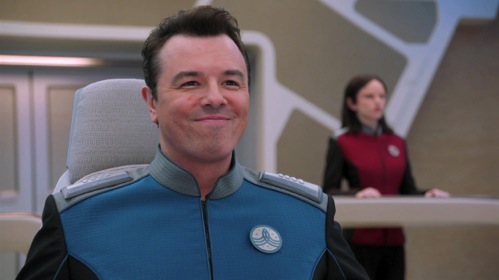
Premiering: Sunday, Sept. 10th at 7 p.m. (central)
Starring: Seth MacFarlane, Adrianne Palicki, Penny Johnson Jerald, Scott Grimes, Peter Macon, Halston Sage, J Lee, Mark Jackson, Chad L. Coleman, Norm Macdonald
Produced by: Seth MacFarlane, Brannon Braga, David A. Goodman, Jason Clark, Liz Heldens
By ED BARK
@unclebarkycom on Twitter
Bitten by Fox’s Cosmos reboot, which he co-produced, Seth MacFarlane creates some space for himself in The Orville.
As Ed Mercer, newly appointed captain of the U.S.S. Orville, his clarion call is “Lt. Molloy, take us out.” Other than that, though, Fox’s The Orville struggles to lift off in the three episodes sent for review.
Its throwaway humor too often belongs in a receptacle while some of the serious business is something of a joke. Although he looks good in his 400-years-into-the-future space getup, MacFarlane is to dramatic acting what Jimmy Fallon has been to tough interviewing.
“We’ll figure it out,” Mercer tells his ex-wife near the close of Sunday’s premiere hour. That also can be said of the entire series, provided there’s enough time. The Orville doesn’t lack for ambition or expense. Nor must it fret about violating any of the often laughably sacred “canon” from previous versions of Star Trek, Star Wars or even Battlestar Galactica. On the contrary, The Orville is completely on its own -- which so far is the problem.
The series begins with Mercer finding his then wife, Kelly Grayson (Adrienne Palicki), in the sack with some sort of space creature. “I’m done,” he says, storming out before being fast-forwarded to “One Year Later.” Having spent much of the interim drinking or otherwise impaired, Mercer learns from an admiral named Halsey (the recurring Victor Garber) that “nobody’s first choice” is the beneficiary of a captain shortage that puts him in line to helm one of Planet Union’s 3,000 ships.
Quickly aboard The Orville, Mercer is soon meeting and quizzing his six senior officers. Besides helmsman Gordon Malloy (Scott Grimes), they are Dr. Claire Finn (Penny Johnson Jerald); second officer Bortus (Peter Macon); navigator John LaMarr (J Lee); chief security officer Alara Kitan (Halston Sage); and science officer Isaac (Mark Jackson).
Even more specifically, Malloy, Finn and LaMarr are humans. Bortus is a single-gendered Moclan, Kitan a Xelayan and Isaac an “artificial life form” from Kaylon. Oh, and Norm Macdonald pops in very briefly from time to time as the voice of a green gelatinous mass named Yaphit.
Got all that? There’s this, too. The Captain’s ex-, much to his consternation, ends up filling The Orville’s vacant first officer slot. This allows the still very much aggrieved Mercer to jab at her incessantly while she in turn bridles.
The drama in Episode 1 otherwise comes from an enemy force known as The Krill, who covet a newly invented time-accelerating device to no good end. A little off-ship derring do ensues before Malloy attempts to execute the difficult “Hug the Donkey” maneuver as prelude to an even more drastic, life-saving measure. “It’s like threading a needle in a hurricane, but I’ll try,” he says gamely. My pulse congealed rather than quickened.
Episode 2 is a bit better rendered after a lame, intendedly comedic exchange between Mercer and the ever-stern Bortus. Also look for Jeffrey Tambor and Holland Taylor as Mercer’s kvetching parents before another emergency situation kicks in. Let’s just say that while their fates hang in the balance, Mercer and Grayson get closer than they’ve been of late before figuring out just where they are.
The third hour, set to air on Thursday, Sept. 21st after two special Sunday outings, tries to raise big questions about gender determination after Bortus and his mate, Klyden (Chad L. Coleman), have a baby in a way peculiar to Moclans.
This particular storyline kicks in after Mercer, Malloy and LaMarr are first seen in cowboy outfits as part of a Three Amigos-style virtual reality game. It’s not as bad as it sounds. It’s worse.
MacFarlane’s efforts at dramatic indignation are particularly weak during this hour, which also includes a life-changing experience triggered by a viewing of Rudolph the Red-Nosed Reindeer.
The Orville needs considerable work to accomplish whatever it wants to be -- assuming that MacFarlane and company even have that answer. For now it’s boldly but very unsteadily going forth, with its jokes working here and there while the action and “messages” bump along at best. It just doesn’t make for much of a blast, but righting the ship isn’t yet out of the question.
GRADE: C
Email comments or questions to: unclebarky@verizon.net
Down and dirty sex sells in HBO's unflinching The Deuce
09/07/17 10:39 AM
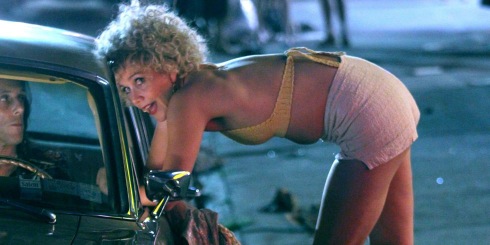
Premiering: Sunday, Sept. 10th at 8 p.m. (central) on HBO
Starring: James Franco, Maggie Gyllenhaal, Gbenga Akinnagbe, Emily Meade, Gary Carr, Dominique Fishback, Chris Bauer, Margarita Levieva, Chris Coy, Lawrence Gilliard Jr., Don Harvey, Natalie Paul, Jamie Neumann, Mustafa Shakir, Michael Rispoli, David Krumholtz, Method Man/Cliff Smith, Ralph Macchio
Produced by: David Simon, George Pelecanos, Richard Price, James Franco, Michelle MacLaren, Nina Kostroff Noble
By ED BARK
@unclebarkycom on Twitter
Perhaps it’s a stretch to say that HBO’s long and winding road has now come full circle from The Hitchhiker to The Deuce.
But who doesn’t like to stretch? So let’s briefly roll with this.
The Hitchhiker, HBO’s first dramatic scripted series, premiered in 1983 as a vehicle for stylized, soft core sex scenes intended to both arouse and differentiate. Well-sculpted people caught in various acts of disrobing were strictly taboo on advertiser-supported competing networks.
In stark contrast, The Deuce (premiering Sunday, Sept. 10th) is anything but beautiful to behold. Set in a thoroughly convincing, garbage-strewn mockup of 1971 New York City, it’s the soiled saga of how the hardcore porn industry worked its way to legalization. The sex often can be decidedly yucky, whether it’s a prostitute plying her trade or a skin flick getting made.
HBO made all eight Season One episodes available for review. The fates of various principal characters won’t be given away here. But let’s note the symbolic climax, so to speak. Episode 8 ends with the June 12, 1972 New York premiere of Deep Throat, which changed everything in terms of hardcore porn going “mainstream.” But that’s really just the beginning, providing The Deuce with very fertile ground for a presumed Season Two.
The principal architect is David Simon, whose previous productions for HBO are The Corner, The Wire, Generation Kill, Treme and Show Me a Hero. This is a guy who doesn’t do glossy. And The Deuce (nickname for the 42nd St. neighborhood between Seventh and Eighth Avenues) is aggressively down and dirty in its depictions of prostitutes, pimps, johns, bars, cops, mobsters and “filmmakers.”
James Franco has the central roles as twin brothers Vincent and Frankie Martino. (Did Season 3 of FX’s Fargo start an epidemic with Ewan McGregor’s portrayals of lookalike brothers Ray and Emmitt Stussy?)
Vincent is a hard-pressed bartender/entrepreneur struggling to make ends meet while his marriage falls apart. Frankie is a pure-and-simple, debt-ridden street hustler who both vexes and amuses his brother. They’re still tight, but the grip can always loosen.
Maggie Gyllenhaal, The Deuce’s other A-lister, plays free agent prostitute Eileen “Candy” Merrell, who operates independent of a pimp. She has a young son who lives with her very disapproving mother. But there could be a way out, even if it’s very much within the sex industry that Candy knows best. Gyllenhaal gives her all to this role, including frequent nudity in early episodes.
A wide array of supporting characters includes pimps Larry, C.C and Rodney (Gbenga Akinnagbe, Gary Carr, Method Man/Cliff Smith); pimp-controlled prostitutes Darlene, Lori and Ashley (Dominique Fishback, Emily Meade, Jamie Neumann); cops Chris Alston and Danny Flanagan (Lawrence Gilliard Jr., Don Harvey); mobsters Rudy Pipilo and Carmine Patriccia (Michael Rispoli, James Ciccone); openly gay bartender Bobby Dwyer (Chris Coy); and bouncer Big Mike (Mustafa Shakir).
Also in the crowded field is Margarita Levieva as student turned bartender Abby Parker, whose relationship with Vincent blossoms. A notably chunky David Krumholtz makes an increasingly strong impression as porn film director Harvey Wasserman, whose growing relationship with Candy is rather affectingly paternal and platonic. Somewhat awkwardly at times, a crusading newspaper reporter named Sandra Washington (Natalie Paul) is added in later episodes.
The Deuce is richly atmospheric, whether it’s all those contrasting theater marquees (ranging from Patton to The Conformist to Mondo Trasho) to Vincent’s bustling Hi-Hat bar, site of a killer version of “96 Tears” in Episode 8. There’s also an all-hours diner suitable for gathering characters. And each hour’s blazing horns, during the closing credits, are a weekly must-hear.
The dialogue is sharp and suitably dicey, as when a pimp says in Episode 4, “I personally don’t mind a little ketchup on my hot dog.” No, he’s not talking about either food or condiments. And in the concluding episode, it’s something of a revelation to Candy and Harvey when a mobster tells them, “Lesbian sex. That’s a punch way above its weight class” in terms of audience appeal.
Franco and Gyllenhaal occupy every inch of their pivotal characters, giving The Deuce an appealing trio of strivers amid a caldron of sex, drugs and protection payments enforced by crooks and crooked cops alike. Everyone wants a piece of the action in times when New York City was an untamed Wild West in every which way except geographic.
Simon has shown time and again that he knows how to make an audience cringe while also contemplating the impacts of his dramas’ oft-unforgiving surroundings. In that sense, The Deuce is the dirty lowdown, with much of the action below the belt. There’s nothing pretty here. But in the eyes of this beholder, you’ll otherwise know great drama when you see it.
GRADE: A
Email comments or questions to: unclebarky@verizon.net
Top of the Lake: China Girl further elevates Moss above her old Mad Men crowd
09/06/17 01:05 PM
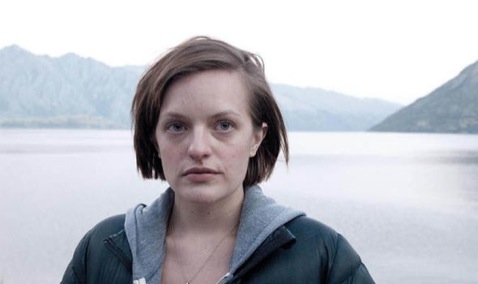
Elisabeth Moss continues her TV career of the year with Top of the Lake sequel, in which she leads the way as detective Robin Griffin. Sundance TV photo
Premiering: Sunday, Sept. 10th at 8 p.m. (central), with two-hour chapters continuing through Tuesday, Sept. 12th on Sundance TV
Starring: Elisabeth Moss, Nicole Kidman, Gwendoline Christie, David Dencik, Ewen Leslie, Alice Englert, Clayton Jacobson, Thien Huong Thi Nguyen
Produced by: Jane Campion, Emile Sherman, Iain Canning, Jamie Laurenson
By ED BARK
@unclebarkycom on Twitter
As post-Mad Men careers go, Jon Hamm seemed like the prohibitive favorite to burst from the pack and stay out front. He hasn’t been hurting for work, but can’t keep up with Elisabeth Moss. Few if any can lately, whatever their recent pasts.
Earlier this year, Moss took on the starring role of “Offred” in Hulu’s acclaimed and Emmy-nominated adaptation of The Handmaid’s Tale. Less than three months after Season One ended, she’s back for another go as angst-ridden detective Robin Griffin in Top of the Lake: China Girl, sequel to the 2013 original that won Moss a Golden Globe.
Sundance TV is home to the U.S. premiere and will air its six chapters on three successive nights, starting on Sunday, Sept. 10th. The BBC had first dibs, ending its China Girl run on Aug. 31st.
Moss had Oscar-winner Holly Hunter (The Piano) to play off in the first Top of the Lake. The sequel enlists two other prominent women, Nicole Kidman (her Oscar was for The Hours) and Gwendoline Christie, best known for playing towering warrior Brienne of Tarth in HBO’s Game of Thrones.
Mildly put, Moss’s Robin has been to hell and back of late and earlier in her life. At the close of Top of the Lake, which was set in New Zealand, she seriously wounded Queenstown-based detective sergeant Al Parker (David Wenham) during their struggle for a handgun. His shocking conduct merited far worse for Parker, who’s survived while Robin battles both post traumatic stress disorder and the indignity of another setback disclosed during a “Four Weeks Earlier” flashback at the start of Episode 2. Those who have seen the first Top of the Lake also know that Robin was gang-raped as a 15-year-old.
“Yeah, I’ve been burnt. Deep-fried,” she matter-of-factly notes during Episode 3.
Otherwise there’s a new case to puzzle out when Griffin uneasily rejoins the Sydney police force. A metal suitcase packed with a corpse eventually washes up on Bondi Beach after being submerged by the proprietors of a legalized brothel known as Silk. Who might this Asian girl be? What was the motive? And will Griffin ever manage to get along with her new and still green partner, Miranda Hilmarson (Christie), who has secrets of her own?
As for Kidman, she’s adoptive mother Julia Edwards, who’s left her husband, Pyke (Ewen Leslie), to fire up a live-in relationship with a female teacher from their daughter Mary’s school. It gets thicker. Seventeen-year-old Mary’s (Alice Englert) birth mother is Robin, who gave her up for adoption and hasn’t seen her in person since. Their reunion is very much complicated by the fact that Mary thinks she loves and intends to marry a haughtily philosophic 42-year-old German named Alexander “Puss” Braun (David Dencik). His residence inn of choice is the Silk brothel, where Mary hopes to join the work force after turning 18, which is soon. (Note: Englert is the real-life daughter of the series co-creator/writer/director, Jane Campion.)
Not everything entirely adds up during the very winding course of China Girl’s six hours. In fact, Episode 3 veers recklessly -- story-wise at least -- into an almost out of body, life-threatening situation involving Robin and one of the drama’s bounteous supply of scummy men.
The performances, however, are uniformly on target. Kidman, part of the recent ensemble in HBO’s Emmy-nominated Big Little Lies, is even more impressive here as the possessive, high-strung Julia while Dencik completely inhabits the role of thoroughly oily “Puss.”
Moss again is impressively nuanced as the unsteady Robin, whose flaws and needs are palpable. As in the first Top of the Lake, she also absorbs physical punishment while demonstrating close to miraculous healing powers.
China Girl ends up solving its central whodunit while also opening a door to future installments with a climatic knock on the door. Moss, now prepping for Season 2 of Handmaid’s Tale,, has two franchise TV roles to carry her career through at least the next several years. Both Offred and Robin Griffin have been badly scarred and scared by the men in their turbulent lives.
So perhaps Moss could use a comedy at some point in the not too distant future. For now, though, she has a thoroughly flourishing, albeit somber career that might well find the likes of Hamm’s Don Draper begging to work with her. Barely two years removed from the Mad Men finale, Moss no longer needs any advertisements for herself.
GRADE: A-minus
Email comments or questions to: unclebarky@verizon.net
